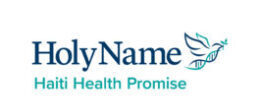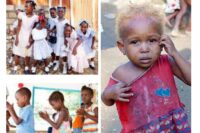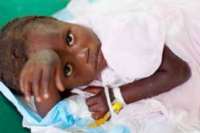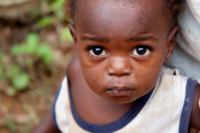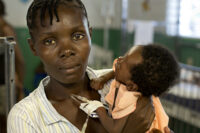 Right now, more young children than you can count roam the streets and jungle landscape of Milot desperately eking out an existence. They number among the 800,000 plus Haitian orphans. In the U.S., friends and relatives of a newly orphaned child agonize over how to break the dreaded news to innocent young ears. That’s not usually a problem in Haiti. An unconscionable number of children don’t hear of their parents’ death, they see it with their own eyes. Many cuddled up in bed with a parent one night and awoke to find their mother or father dead beside them; claimed by cholera, untreated injury or infection.
Right now, more young children than you can count roam the streets and jungle landscape of Milot desperately eking out an existence. They number among the 800,000 plus Haitian orphans. In the U.S., friends and relatives of a newly orphaned child agonize over how to break the dreaded news to innocent young ears. That’s not usually a problem in Haiti. An unconscionable number of children don’t hear of their parents’ death, they see it with their own eyes. Many cuddled up in bed with a parent one night and awoke to find their mother or father dead beside them; claimed by cholera, untreated injury or infection.
Think for a moment. Can you even imagine the horror of waking to see your mother or father dead? For many of us, we can’t even imagine not having a comfortable childhood bed of our own. Think it through some more. If you woke up to such an unspeakable nightmare at age 4 or 9, what would you do next? Can you imagine your child facing that tragic dilemma?
Some Haitian children in this situation find room in a relative’s or friend’s house and share meager portions of their food; when it’s available. Most however begin life on the streets and start the arduous process of getting their needs met; needs they can rarely define beyond the basics of food and water. Love, friendship, safety, stability and privacy are way too lofty childhood needs to even name or recognize.
Healthcare, education and even clothes are often too elusive to pursue. So they eat whatever they find or can beg for in the streets and they lay their tiny bodies down to rest for the night on whatever piece of dirt or stretch of corrugated tin presents itself at the moment tiredness overtakes them. The next day, the search for food begins anew.
The resiliency of these children clothed in heartbreak takes our breath away. We know them well. They arrive at Hôpital Sacré Coeur on a regular basis. Staff spots them on the streets and convinces them to come to the hospital for treatment. Groups of youngsters follow volunteers to campus and then make the hospital community their home base. Strangers come by at night and leave babies on our doorstep.
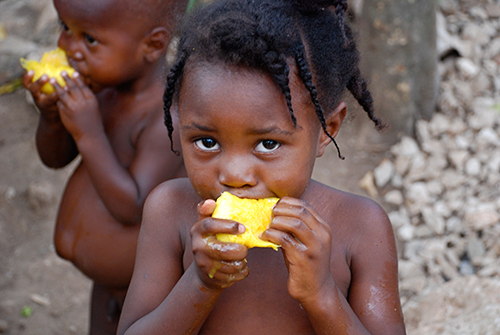 Whatever we can offer these youth, we do. Through the gracious generosity of your donations, the injured are treated, the malnourished receive proper food and many finally set foot in a school. There is no social welfare system of consequence in Haiti. In the Milot region, we are the institution of hope for the children who had hope ripped from them at a too tender age.
Whatever we can offer these youth, we do. Through the gracious generosity of your donations, the injured are treated, the malnourished receive proper food and many finally set foot in a school. There is no social welfare system of consequence in Haiti. In the Milot region, we are the institution of hope for the children who had hope ripped from them at a too tender age.
Right now, some child walks the fine, treacherous line between having a parent and becoming an orphan. Their mother or father harbors a silent, deadly disease; a runaway infection, or an improperly tended injury.
It doesn’t have to be this way.
For almost 30 years, Hôpital Sacré Coeur has served the 225, 000 people of Northern Haiti with dedication, skill and love. Through full service medical and public health education outreach programs, over 100,000 people a year receive the treatment and education necessary to stay alive and live productive, hopeful lives.
Mothers birth their children in safe environments. Breadwinners receive the medications they need so they can continue feeding their families. Children have a shot at a healthy future.
Right now, you can not only help an orphaned child, you can help spare other children that desperate fate.
When you send a donation to CRUDEM to support the work of Hôpital Sacré Coeur, you can give someone, who just happened to be born in a low resource country, the chance to have a life.
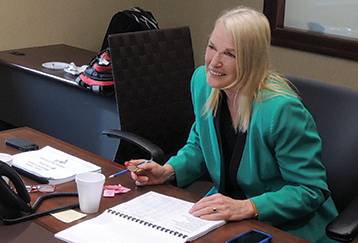 Right now, start a new giving tradition. Give a Life!
Right now, start a new giving tradition. Give a Life!
Giving doesn’t get more meaningful than that.
Blessings,
Joni
Joni Paterson, M.Div. Ph.D. serves as Director of Development & Administration for CRUDEM. An ordained minister with the United Church of Christ, she was a hospital chaplain before joining CRUDEM in 2003 and has extensive experience in communications and strategic positioning. She lives in Western Massachusetts.
